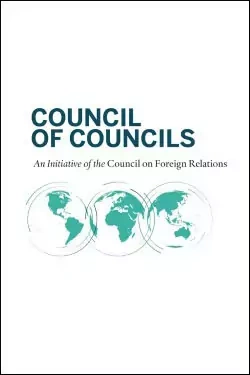
Council of Councils Fifth Annual Conference
Insights From a Council of Councils Workshop

- Report
Overview
Growing geopolitical rivalries and political opposition to globalization are weakening prospects for effective multilateral cooperation. Dramatic flows of refugees and migrants—generated in part by the grinding conflict in Syria—have exposed gaps in multilateral efforts to end violence and address humanitarian emergencies, demonstrated how weakness in international institutions affects the most vulnerable communities, and testified to the need to improve international coordination and burden sharing. Meanwhile, divergent views on global economic governance and international internet regulation have roiled both markets and government relations. The absence of a region-wide security organization in Asia complicates growing tensions over competing maritime claims. To consider how best to address these challenges, thirty-nine delegates from twenty countries gathered for the Council of Councils Fifth Annual Conference in New York City.
The report, which you can download here, summarizes the discussion's highlights. The report reflects the views of workshop participants alone; CFR takes no position on policy issues.
Framing Questions for the Workshop
Managing Flows of Refugees and Migrants
More on:
What are the primary shortcomings in the global regimes for supporting internally displaced persons, refugees, and migrants? How can global capacity, funding, and coordination for humanitarian action be improved? How might humanitarian support be better linked with development and be more responsive to the needs of individuals unable to return to their home countries? What would successful outcomes for the 2016 World Humanitarian Summit and the high-level meetings on refugees planned for the opening of the UN General Assembly be? What reforms are necessary to current international institutions and legal instruments governing global migration?
Preventing the Next Global Economic Crisis
What were the major lessons from the 2008 global financial crisis, and did the reforms implemented in its aftermath address the systemic vulnerabilities it had revealed? What are the primary sources of instability in the global economy today? What role should multilateral institutions and forums, such as the International Monetary Fund and the Group of Twenty (G20), play in preventing another global crisis—and are they adequately equipped to do so now? Will voluntary regulatory reforms and nonbinding policy– coordinating bodies keep pace with the globalization of the financial system? Will new institutions, such as the Asian Infrastructure Investment Bank and New Development Bank, compete with or complement existing institutions like the World Bank? What is the global impact of divergent monetary policies among advanced economies, and can their negative consequences be mitigated?
Assessing the Syrian Crisis
What are the current prospects for sustainable peace in Syria, and how can the United Nations contribute to these negotiations? What does the prolonged crisis mean for the role of the UN Security Council as the premier body for ensuring international peace and security? Are major world powers and regional actors playing a productive role in the Syrian peace process? What role can multilateral institutions play in the event of a lasting cease-fire?
Moving Forward on Global Internet Governance
Are there areas of consensus that can form the basis for bridging the divide between competing views on internet governance? Can steps be taken to help governments, the private sector, and civil society build consensus on establishing global cyberspace rules for beyond what has been agreed to at the UN Group of Governmental Experts? How can transparency be improved in cyberspace to monitor the implementation of cyber-enabled economic espionage agreements such as the 2015 U.S.-China agreement and the 2015 G20 Communiqué? Do data localization policies undermine data security and privacy?
Framing an Asian Security Architecture
What principles, norms, and rules might form the basis for a comprehensive Asian security architecture? Does the experience of the Organization for Security and Co-operation in Europe hold any promise as a model for security and cooperation in Asia? What role can existing multilateral institutions and forums, including regional institutions, such as the Association of Southeast Asian Nations (ASEAN) or the ASEAN Regional Forum, play in moving toward a consensus? What are the main obstacles? What role should the United States and other major powers outside Asia play in helping provide security in Asia?
More on:
 Online Store
Online Store